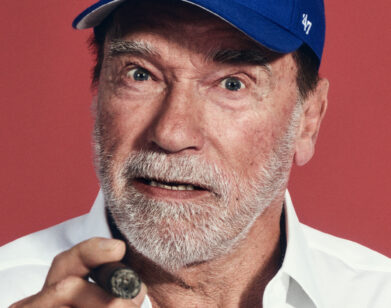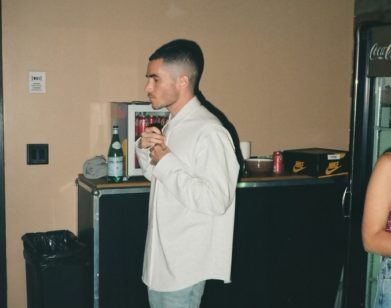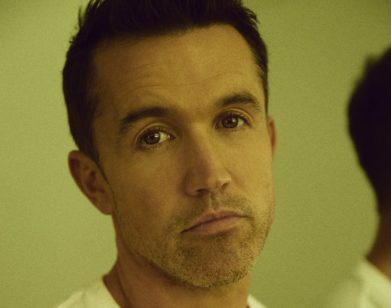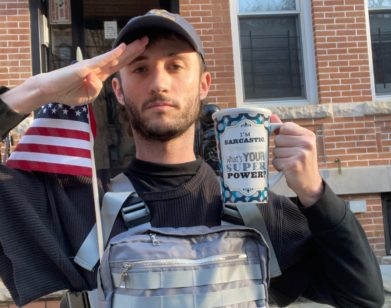Politics
A Conversation Between Senator Anne Ranch and Demi Lovato (and Danny DeVito)
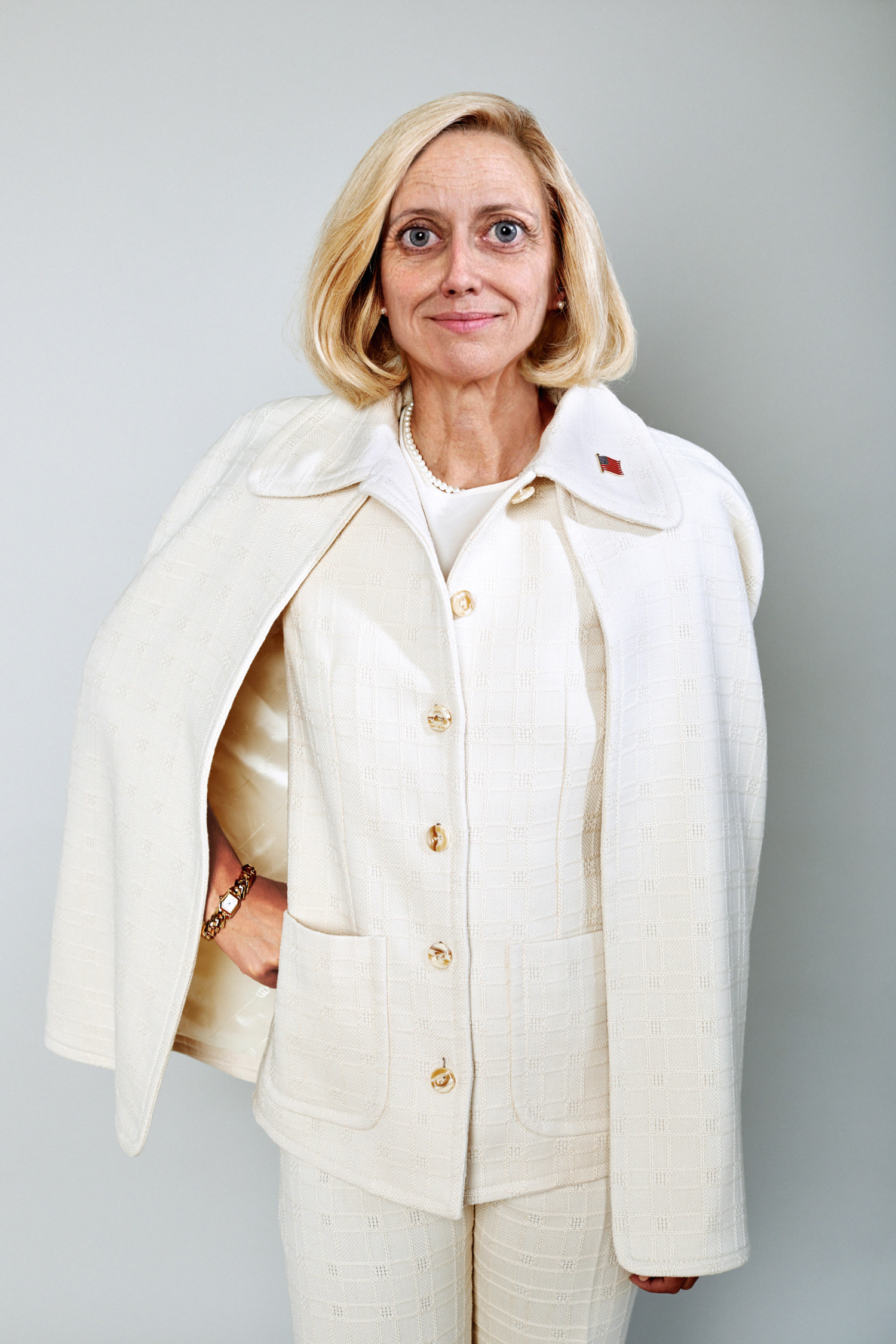
Jacket and Pants by Gucci. Earrings and Necklace (worn throughout) by RJ Graziano. Top and Pin (worn throughout) Senator Ranch’s Own. Watch by Maillon de Cartier.
On July 20 of this year, The New York Times ran a front-page photo of a South Texas woman named Kimberly Muñoz being prevented from holding her newborn baby because of her Covid-19 diagnosis. That same day, Anne Ranch was sworn in as a senator of a state. Her winning slogan? “If one of us loses our balance then we all fall down.” On July 27, the newspaper of record reported that “Cities Are in Bind as Unrest Flares Over U.S. Actions” and that the “Virus Cuts Off Global Lifeline Aiding Millions,” along with other stomach-punching news items and a large photo of a funeral caisson in Selma carrying the body of the civil rights activist John Lewis, who died earlier that month. That day, Ranch posted an old picture of herself on Spahn Ranch with a caption that began, “I catch a lot of flack for having been a Manson girl.” And when, on August 7 from her personal bunker, Ranch announced her reluctant bid for president, she did so against the backdrop of a deadly explosion in Beirut, a report that the “U.S. Is Alone Among Peers In Failing to Contain Virus,” and continued protests over police killings in Minneapolis, Louisville, Atlanta, and beyond. The candidate wore her finest Aritzia outfit.
The thing about Anne Ranch is that she doesn’t exist. She was brought to life by her “campaign manager” Charles Rogers, the writer, director, and co-creator of Search Party, a procedural-on-poppers set in a world of millennial hyper-narcissists. Ranch’s likeness, the eyes of Steve Buscemi pasted onto a revolving door of bodies belonging to Nancy Pelosi, Elizabeth Warren, and even Lady Gaga at the entrance to the Met Ball, is at once preposterous and kind of warm. Unlike so many political send-ups, there’s nothing sleek or silver-tongued about Ranch. The brainchild of Aaron Sorkin, she is not. And in Trump’s America, it’s oddly comforting to endure a candidate, however fictional, whose biggest foible on any given day is the shattering of the Chihuly that hangs above her breakfast island. When we informed Anne’s team that the pop superstar Demi Lovato would be interviewing her, there seems to have been some miscommunication on their end, leading Ranch to believe that the interview was between her and Danny DeVito, a similar sounding name. —NICK HARAMIS
———
DEMI LOVATO: Anne, what are your qualifications to be a senator?
ANNE RANCH: Thank you for your inquiry. But before I get to it, I have to spend a moment singing your praises. I have been a tried and true fan of yours since your early days. I remember returning to my American hometown to take care of my Pop (a Pop is a form of father) in the late 1970s, right after I’d finished law school at Notre Dame University. We would watch you in the television program Taxi together and he would aggressively hurl a Tab at the screen, growling, “Who is that?” I would say, “That’s Danny DeVito, Pop. That’s Danny DeVito.” And here I am today, being interviewed by the late, great Danny DeVito himself. I know my Pop is looking down, still frustrated about who you are to this day. And to answer your inquiry exactly, you do not need to have any qualifications to become a senator.
LOVATO: What political party do you belong to and what state do you represent?
RANCH: I am a U.S. senator. I hope that clears up any confusion you might have.
LOVATO: What was the moment when you first thought, “I’m destined for a life in politics”?
RANCH: Not to be prickly, but destiny is a controversial ideology, so I may bow out of addressing this on your terms, Danny. Instead, I’d like to publicly remember the moment I was gently forced to become a U.S. senator. As you’re likely well aware, every third Thursday of each month, most public pools and discount outlet centers make space for a fold-out table with a senatorial recruiter (these are often former senators who have since retired but are not yet ready to pass away). I fondly recall the moment that I was physically stopped as I passed a table near a fountain (they can also sometimes be found at or near small man-made bodies of water, and I apologize for not saying so earlier). Lo and behold, it was former U.S. senator for the state of Oregon Maurine Neuberger, and she had slunk way down in her chair, stretched her legs out far enough to reach me, and painfully snapped her ankles around my shins like a bear trap. I did not pause because it was at a time in my life when I hadn’t yet embraced the value of my own shins. Evidently this indifference was a powerful sign to Neuberger that I was qualified to become a United States senator, and she simply whispered with intensity, “You.”
LOVATO: I spoke at the 2016 DNC to raise awareness about mental health, performed at the March for Our Lives anti-gun violence rally in 2018, and am passionate about the LGBTQIA+ community, social justice, and voter’s rights. I’m curious: What do you think are the most important issues facing America today?
RANCH: As a politician, it’s important to me that I never make assumptions about what other Americans want or need, as that might appear overly familiar. For this reason, I’d prefer to focus on what’s currently on my own mind, in the hopes that my point of view is somehow everyone’s. For instance, my husband Paul and I have had to make great adjustments in light of our culture’s newfound resistance to socializing. We found ourselves deeply missing travel and decided to remodel several wings of our Washington, D.C., home to resemble the International Service Terminal of Chicago’s O’Hare Airport. We added moving walkways and large advertisements for the jaw-dropping film Tenet. Every morning we wake up earlier than we’d like to, groggily zip up our suitcases, and head to the “airport.” We travel well together and have found that this new life-hack has brought us even closer together.
LOVATO: What’s a piece of advice you didn’t ask for, but that you’ll never forget?
RANCH: Mr. DeVito, I appreciate this question because I am gobsmacked by how often advice comes in pieces, and it’s high time that we blow the lid off of this phenomenon. I regularly find myself disappointed in how people refuse to intervene to completion. For example, I was recently at a difficult crossroads in my life (a physically strenuous traffic intersection), and I asked a stranger how to find a cafe with privacy so that I could text message. They said, “My advice would be to go—,” and then stopped speaking. The light went out in their eyes, and they walked away from me as though they had been called away to a cold and brutal realm. I desperately wished to know which way they wanted me to go. The mystery haunts me, and I will never forget this piece of advice.
LOVATO: What’s the best lie you’ve ever told?
RANCH: Hoo boy. I was once seated next to Donald Rumsfeld at the annual Washington, D.C. Power Gala (a seven-hour dinner where every figure of relative significance in the politics community announces their net worth while a laugh track plays over a sound system). Donald (who I have known for years and with whom I co-own a consumer-grade submarine) took the night to monologue about how he can’t wear ankle socks because he will catch a cold, and after two hours of this, I began to grow very anxious. I found myself telling him that he was asleep and that I was just a dream.
LOVATO: Which of my songs would you most like to dance to at the Inaugural Ball?
RANCH: I don’t remember you doing this, but after a quick Ask Jeeves session, I see that you sang “Lazy River” in the 2000 film Drowning Mona. I suppose that is my choice.
LOVATO: Why is your favorite movie My Girl, and what does it say about your relationship to feminism?
RANCH: The question I am most often asked (by young men, interestingly) is what my favorite film is. I often cite My Girl out of anxiety. I have never seen the film but I remember passing the poster one evening in 1991 after walking out of seeing the motion picture The Rocketeer (about a man who consents to being propelled into the sky). You’d think I would say that The Rocketeer is my favorite film considering I can speak specifically about it, wouldn’t you? In my mind, My Girl is a modern-day folktale about a single woman working in a tax office who wishes she could improve her email (electronic mail) skills. She has mastered how to CC but is still navigating what it means to BCC, and she believes the stakes are higher than they actually are. Throughout the film, her name is withheld from the audience and it is all the audience can think about. In the final moment of the film, you see her filling out a form at her surgeon’s office (her knees blow out in the first act). On the form, she writes her name and the camera reveals that her full name is “My Girl.” I think this is a powerful moment that completely changed the course of our nation.
LOVATO: What were the best and worst parts about being a Manson girl?
RANCH: My time renting a room at Spahn Ranch had little to no impact on my life. The people there were punctual and polite, but, at times, I felt that they over-seasoned the community meals. I often felt that I was in their way. I was studying between semesters at Notre Dame and was never quite sure where I could set up shop with my reading. I would pick a corner to read in and one of them (I can’t remember their names, but they were all lovely) might say, “What the fucking fuck?” and I would feel guilty as though I should have known that I was breaking a boundary. Ultimately, it was best for me to leave because I overheard whispering outside of my room about how my use of hairspray was “a sign I would fuck them over.” One of them called me a car when it was my time to leave, and I will always deeply appreciate that.
LOVATO: What’s the most insane rumor you’ve heard about yourself?
RANCH: When I was told that I was running for president of the United States (of America), I was so stunned that I dropped the plate that I was eating off of (I sometimes eat standing up because I prefer not to envision the gastric maze your food must traverse through from folding your body in the sitting position). It took me two hours to realize that it wasn’t just a rumor,. It was confirmation I needed that life is just a series of moments we have no agency over.
LOVATO: You’ve spoken out against “brunetting,” the process of editing one’s hair color to a darker shade because it makes for better TV. What other adversities have you overcome?
RANCH: I have overcome adversities that I believe makes me human and relatable. When I was little, I was diagnosed with a not altogether uncommon syndrome called Validation Loop Closure Compulsion Disorder, but today we often refer to it as the “You’re Welcome” Disease. I can’t quite access my point of view at the time, but I know that every interaction I experienced felt as though I was being thanked. I would find myself saying “you’re welcome” after anyone said anything. It became a hindrance in the classroom when a student would raise their hand and ask for permission to go to the bathroom. The teacher would oblige and then I would placidly chime in, “You’re welcome.” During a test, I would circle the answer on the paper and calmly state, “You’re welcome,” feeling that I had done the test a favor by answering another question. With perseverance, the syndrome tapered off, and when I went off to college, I found myself saying only “welcome,” and everyone began to believe that I must have owned the university and was responsible for their admittance. By the end of my senior year, it had whittled down to just “come,” and groups of people would follow me around endlessly, assuming I was taking them somewhere worthwhile.
LOVATO: You famously had mixed feelings about running. How are you feeling about possibly winning?
RANCH: I continue to have beautiful trepidations about running. I am not eager to change my habits (I have six habits), and it is my understanding that I would have to move residences if I were to win. I have currently mastered how to walk around my own home with my eyes closed (doing so saves needed energy), and I would likely smash into walls if relocated. One thing I would enjoy about winning is that every morning I call everyone in my rolodex and scream, “I won!” because it’s an empowering way to start my day. You could say it’s my coffee. If I win, it would give me an actual reason to enjoy this daily practice.
LOVATO: If you win, what will you conquer first?
RANCH: If I win (my team always stops me when I say this, screaming, “WHEN! It’s WHEN I win!” and then I hear loud bangs as they slam their phones against the wall over and over, exhausted by inability to follow direction), I would take a few weeks resisting this new change. I imagine that the first few months might be overwhelming to all four senses (my age group was taught that touch is not a sense and I have to agree), so I would probably turn my phone off and sit silently in my home Alamo Drafthouse, where I often sit to pray. All to say, I would try to conquer my own resistance to become president.
LOVATO: What is the worst-case scenario for the future?
RANCH: I recently watched the moving picture Contagion, about a blonde woman who gets a cold at a fabulous casino and it puts the entire world on red alert. I would very much resist a future in which there was a global pandemic that radically shifted the way people interact with money. I would want someone to tell me if this was ever happening and I assume voters might feel similarly.
LOVATO: What has this pandemic confirmed or reinforced about your view of society?
RANCH: I do not understand that question.
LOVATO: Which young leaders of the moment inspire you?
RANCH: The cast of Good Boys inspires me. I read an article about how their sleep schedule was compromised because of the film’s production and it made me feel more open to compromising my own needs.
LOVATO: If you could stop time at one particular moment in your life, which moment would it be?
RANCH: I would very much like to stop time right now. To be perfectly candid with you, the longer that this interview has gone on, the more I am beginning to suspect that you might not be the cherished actor Danny DeVito. I remember him being more mezzanine level (a progressive term for someone who is low to the ground) than you are. And I remember how my Pop would growl, “Man. Man. Man,” at the television, hurling Tabs that sprayed everywhere like the fountains of Versailles, leading me to believe you should be a man. I realize now that I misread your name and that you are Demi Lovato (a name I am deeply unfamiliar with), and I do not mean to be confrontational but I suspect you might owe Danny Devito an apology.
———
Model: Erika Allen
Hair: Lucas Wilson




